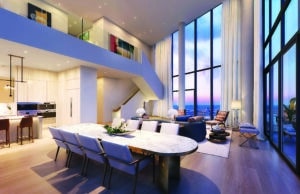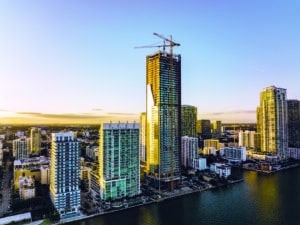
Developers are preparing to begin pre-sales this fall for 166 Ritz-Carlton-branded condominiums at the South Station tower, including this penthouse unit, in what is rapidly becoming a standard partnership between Boston developers and well-known luxury brands. Image courtesy of Hines
If you brand it, will the condominium buyers come?
There’s certainly reason to think so. From the Seaport to the Back Bay, it might seem like every new condo building going up in Boston has a condo component attached to a well-known luxury brand.
There’s the St. Regis Residences, Boston, in the Seaport near Commonwealth Pier. Blocks away, the air rights development rising over South Station will eventually be home to Ritz-Carlton condos perched above the office component of a 1 million-square-foot tower.
There’s already a Ritz-Carlton hotel and condo development in the Theater District, and the Back Bay added a second Four Seasons with condos in 2019. The neighborhood is slated to see the arrival of the Raffles Residences Boston later this year as part of a mixed-use development also featuring the debut of the luxury Singapore-based hotel brand.
The branded condo blitz isn’t just limited to hotels, either. Fashion houses and luxury brands like Fendi, Missoni, Baccarat and Aston Martin are also now attached to condo developments underway in cities like Miami and Dubai. Don’t rule out Boston from eventually getting into this luxury goods-branded condo bonanza, experts said.
“I would be surprised if, in 10 years, any real estate developer branded their own luxury condominium tower,” said Michael Panagako, a managing partner at Boston-based branding consultants Ten Feet Tall, which worked on St. Regis-branded residential projects in Boston and Chicago. “I think that 10 years from now and beyond, they will almost all be flagged [with an existing luxury brand].”

A condominium tower branded with the fashion house Missoni’s name under construction in Miami’s Edgewater neighborhood in 2021. Luxury brands are licensing their names to developers around the world. iStock photo
Rent Versus Own
Money talks, and the premiums that materialize from a branded condo project provide one compelling argument to link up and license a deal with an existing luxury brand. Branded condo projects on a global average see a 30 percent price premium over unbranded projects, according to a report last year from real estate firm Savills.
It’s sometimes an easier lift for a developer to go down a path of reaching a licensing agreement with an existing luxury brand rather than spend all the time, money and resources coming up with a new brand organically.
It’s not impossible: Millennium Tower Boston and The Millennium Residences at Winthrop Center are both downtown luxury condo developments that aren’t associated with an outside brand.
But creating a new brand out of thin air doesn’t come cheap.
“This brand that you are creating as a local developer must rival international brands like Ritz-Carlton, Four Seasons or St. Regis,” Panagako said. “That is an enormous weight on the shoulders of a local developer or regional developer because they have to create this brand on par with these global brands. Then, they have to spend a significant amount of money getting it out into the market and educating people that this is a brand that rivals those global brands.”
Resting on Reputational Laurels
Going the branded route, even with something not usually associated with real estate like a Fendi or an Aston Martin-flagged condo project, means the developer can lean on the known entity’s existing reputation for high-end finishes and resident services to set the tone of the new residential project.
“The genesis of the evolution of bringing a flagged brand to Boston [residential real estate] really was created by the demand of service,” said Sue Hawkes, managing director of The Collaborative Cos. “A lot of these buyers have multiple homes, and they’re gone from three to six months out of the year. To have that ability to just call the concierge or call the management company and know that that service is there for you, that is a wonderful comfort for people who can afford it.”
The ultra-luxury end of the condo spectrum isn’t entirely immune to an overall jittery housing market cooled by higher interest rates and layoffs in the tech sector. But there is still a steady volume of sales at the priciest points in the housing market, according to TCC’s most recent quarterly report on Greater Boston multifamily sales and rents.
“We haven’t seen the prices being lowered, but we have seen the absorption being slowed,” Hawkes said of lower transaction volumes in light of higher mortgage rates. “There are people that have put these decisions on the back burner. There’s still plenty of money in the Greater Boston market, but they don’t want to leave where they are because they’ve got a two or 3 percent interest rate [on their mortgage].”
Dangling a trophy asset like a luxury-branded condo can be a compelling selling point in any kind of real estate market.
There are an additional 622 luxury units either in planning or already under construction in Boston, and the first three months of this year saw the highest cost per square foot – $2,229 – in the urban core’s recorded history, per the TCC report.
It’s highly likely much of Boston’s future luxury condo stock will have a well-known brand attached, according to local real estate executives. Just as office tenants are migrating toward class A towers in a “flight to quality,” condo owners appear to be looking for a similar top-shelf experience behind their next home purchase.
But going the branded route is no silver bullet or guarantee for success for developers, either.
“There’s the simple brick-and-mortar component, and I think that’s easy with a nice building, whether it’s Raffles or Four Seasons or St. Regis or whether it’s Armani, Versace or whatever it might be,” said Michael Carucci, an executive vice president at Gibson Sotheby’s. “The challenge is going to be delivering the customer experience. Can you deliver what all these luxury brands deliver? It’s extremely competitive.”






